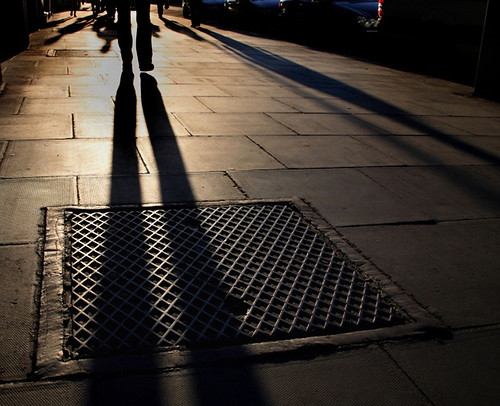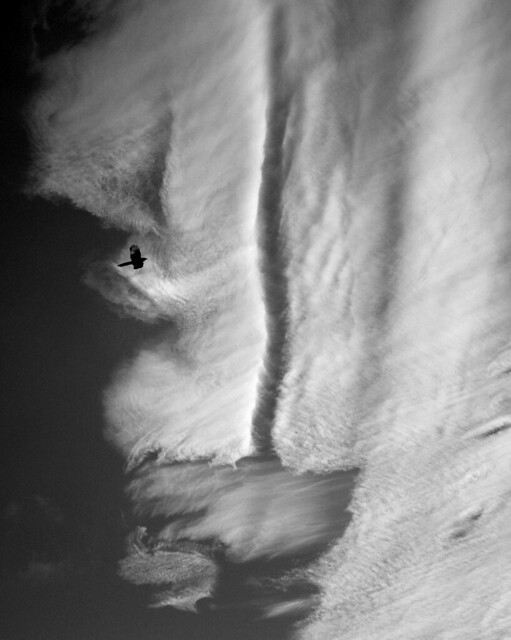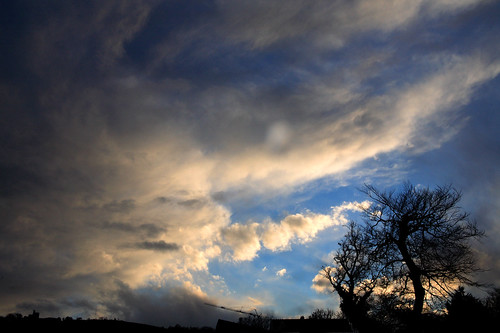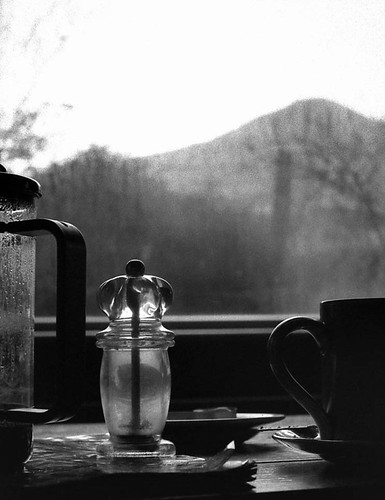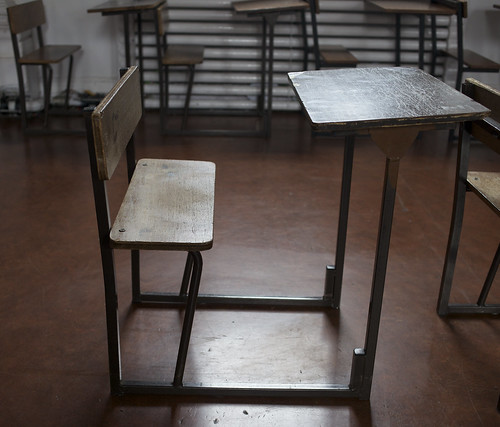Kindergarten,
St. Kilian’s
A grey house lost in a big field
is ‘the German school’. Herr Schmidt’s eye-patch is real.
Herr Müller
does not smile.
During break I learn how to slot together two dry
stalks of horse chestnut leaves to make
the bones of an airplane. When I try
the new noise on my tongue, it
gets stuck
in my teeth, though I can
count from null
to elf, and bid Guten morgen,
Gute nacht ––
Merit Cards,
St. Conleth’s
Stiff, with rounded edges, like invitation cards,
there are three kinds, three colours.
The best, to say you are doing good work or great,
is pink as a strawberry milkshake.
My later ones, anaemic blue, carry ‘Remarks’
such as my mother’s ‘I’d like to see higher marks.’
The rarest, iodine yellow, you can almost smell:
miching? stealing? –– one stop from being expelled.
Headmaster
There is his specially made
leather ‘biffer’ –– hand-sewn for the trade?
He calls it Lizzy, and there is a Big Lizzy too.
He has his eye on me, on you,
‘gurriers’ in our army coats of ‘bull’s wool’.
When he warns ‘There’ll be wigs on the green’
my blankness flickers, screens
some antique scuffle: a lawn, powdered rugs
flying from what must be our own heads
done up as Ladies, M’Luds.
So I am almost prepared when he brings in
a new boy (who looks already old and beaten)
and heartily invites him
to ‘tell us how many schools you’ve been expelled from.’
Science
Clear as Once Upon a Time, we
arrive
at the three states of being:
Alive
Dead
Never Alive
Two Maths
Teachers
Red-faced O’Byrne, rasping in his chalky cloak,
swirls and pounces. No use, something un-
clicks when numbers wink
into letters.
Murphy, like Groucho,
raises a clownish eyebrow:
‘I’ll tear your hides off and hang ‘em up
like strips of bacon!’
The
blackboard is a prop
for what sizzles and smokes: entertainment, exit lines.
Chemistry
The lovely wrongness of mercury.
I ask Paddy where we can get some, so
he asks the Japanese boy, Sato,
who escorts us into the empty lab
as if he owns it. We tip
a whole Aspirin bottle’s worth out of a tube
and before we can wonder
what to do with it, Paddy –– in secret communion
with some inner double-dare –– rolls
one of those molten heavyweight pearls
off his palm onto his tongue.
New Teacher
My coddled home-life couldn’t have prepared me
for Poole –– flushed, freckled, big as a bull,
always on the simmer. Catching me
dozing again, he puts his full weight into it
and the telephone in my left ear is ringing for weeks.
Geography
Dr Goldin (Butsy): too old, too gentle,
his heaped ashtray a caldera of crushed words.
Each time he turns, we hum behind his back
till he stops, flings the duster –– a jarring clack! ––
glares at us and erupts: ‘You pack of bastards.’
Confirmation
Of what? And how difficult could it be?
Transubstantiation? The Trinity?’
But when the soft face under the tall hat mouths
‘Who made the world?’ it wafer-melts
into its echo: the one test
you couldn’t fail to pass, or digest.
Latin
Mr Banks’ drone could not be drier
as he conjugates: amo, amas, amat…
till a terrible drought rolls in along the Tiber,
the flagons empty, love itself gone flat.
English
‘I wandered lonely…’ as Gardner (Weedy)
passing our window –– in his hands
a book held open like a breviary.
Poetry, since now and then he’ll chance
on a nugget and halt to tilt his face
at the sun: a practiced smile, radiance.
A Reading
No matter if you’re a dosser or a swot,
when asked to read a poem aloud the protocol
is to sound like a bored robot ––
then Kinsella’s Garden
on the Point
where ‘the speckled bean breaks open’ and ‘the snail
winces and waits’, and the brunt
of some odd imperative pushes me ahead
of myself, to brace my elbows, cover my ears
and read it, for once, the way it should be read.
French
Mr Feutren (Fruity) isn’t from France
but Brittany. Important. Make no mistake.
Something –– anger? passion? –– has shorn his face
to a bald, beak-nosed, hunched-electric presence.
Yes, he fought with the SS during the war.
A Breton nationalist, why should he hide
what he believes? What he did was justified,
though I’m not sure who these justifications are for.
The Irish, so stupide! Hard to believe
how little we know, and how can we make a start
when, in restaurants, we ignore the heart
of asparagus, to nibble at the leaves.
Now he has lost patience and swoops to wrench
some slowcoach from his desk. I am in his sights
and will be next. Because of (or despite)
whatever he fled, he teaches excellent French.
Biology
On a wall in the jacks: I
am 13 and I love gees ––
‘The penis is then placed in the vagina…’ ––
breaking the seal, entering the soft-lit harem
in a smuggled Penthouse
(all those misted women) ––
but when a 5th year boy unfolds a page of these
close-ups –– cunts in lurid mugshots –– we’ve skipped
to a field manual, a dressing of wounds, ripped.
Rugger
A door swings open or shut
for good, when in the midst of it
I discover I’ve laced
my ugly, new, unbroken pair of boots
to the wrong feet.
Break
–– da-Ding, da-Ding,
da-Ding
the hand-held bell
swarms us onto the concrete, voices up
and over the high stone wall ––
Get up the yard! I’ll swop you… Whew, just saved!
What’s white and moves quickly across the floor?
What’s the definition of agony?
Show us your steely!
I’ve heard that before.
Quickly, which would you rather be
nearly-drowned-or-nearly-saved
–– da-Ding, da-Ding,
da-Ding
Coláiste na
Rinne: An Interrogation*
–– Ar dhúirt tú rud mar gheall ar shite?
–– Ní dhúirt mé.
–– Dhúirt tú.
–– Ní dhúirt mé.
–– Dhúirt tú.
–– Ní dhúirt mé.
–– Dúirt!
[…]
–– Scríobh!
Prefect,
Sandford Park
Lunch queue: someone shouts (his voice and face
straight out of Tom
Brown’s Schooldays):
‘You! Boy! Bring me a jug of water!’
Can he be talking to me? ‘You must be joking.’
But as he looms, long and tight-lipped, I see
no joke, unless he thinks it funny
to noose my tie until I almost choke.
The Mock
Leaving
What can they make of me, so studiously dreamy
I fall asleep in strict Bill Tector’s class ––
my ear tuned to nothing much at all
unless it’s the sotto
voce lullaby
from the desk behind: Rooney
intoning the same Pink Floyd line
over and over: ‘the lunatic / is on the grass…’
The Leaving
I never miched before, so it feels strange;
too easy to stay in my seat as the bus pulls
away from my stop in Ranelagh, where the push
is on for the Leaving Cert. Well out of range,
I hop off, drift downstream on Grafton Street’s
quick/slow shuffling pavements, where I catch
the breath of roasted coffee beans and let
Bewley’s (The Church of Take-The-Weight-Off-Your-Feet)
inhale me. In the basement, lunch money spent
on hot milky coffee and buns, I begin to orient
myself among the tidal people, drag and flow
of conversation, places and to be or go.
For three weeks I hold this course, till I can say
I took my Leaving in Bewley’s Oriental Café.
Art
School, Dún Laoghaire
Army-jacketed, smoking a roll-up, safe
in my hair –– so long I can almost sit on
it ––
am I too early, too late
or somewhere in between? Time to move on
from that open-mouthed self portrait
that might be a scream or yawn.
*Footnote: Ring
College: An Interrogation
–– Did you say
anything about shite?
–– I didn’t.
–– You did.
–– I didn’t.
–– You did.
–– I didn’t.
–– You did!
–– Write it out!
